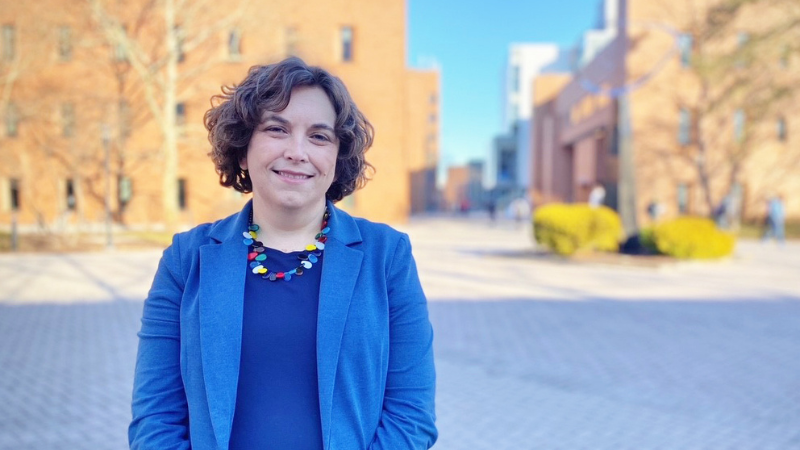
Rebecca Scales
Associate Professor
Rebecca Scales
Associate Professor
Education
BA, Hollins College; MA, University of Georgia; Ph.D., Rutgers University
Bio
I am historian of twentieth-century Europe and my research focuses on the social and cultural history of France. My first book, Radio and the Politics of Sound in Interwar France, 1921-1939 (Cambridge, 2016, 2018) examined the democratization of radio in France, uncovering how how broadcasting became a new platform for political engagement by transforming the act of listening into an important, if highly contested, practice of citizenship. My research on radio broadcasting in France and its empire has also appeared in French Historical Studies; French Politics, Culture, and Society; Media History; and Comparative Studies in Society and History.
Since completing my first book, I have continued researching global radio history, co-authoring a recent history of international broadcasting entitled Wireless World: Global Histories of International Broadcasting (Oxford, 2022). In the summer of 2021, I co-directed an National Endowment for the Humanities Summer Seminar for higher education faculty entitled "Radio and Decolonization: Bringing Sound into Twentieth-Century History" with Andrea Stanton (Univ. of Denver) and Alejandra Bronfman (SUNY-Albany). We are continuing this project by organizing an NEH-funded conference on radio and decolonization in July 2024.
With support from the NEH, I have begun a new book project entitled Polio and its Afterlives: Disability and Disease in Twentieth Century France. Weaving together histories of epidemic disease, public health, and medicine with the social and cultural history of disability, this interdisciplinary book examines how polio transformed France’s welfare state and health care systems, fueled vaccine development and biomedical research, and mediated France’s geopolitical status during an era of decolonization and rising American predominance.
My research has been supported by national and international grants from the Social Science Research Council, the Embassy of France in the United States, the American Philosophical Society, the National Endowment for the Humanities, and the Société des Professeurs Français et Francophones d’Amérique.
At RIT, I teach courses about twentieth-century Europe, imperialism, the world wars, urban history, the history of travel and tourism, and the history of science, technology, and medicine. I'm particularly excited to be developing a new course, “The Global History of Epidemics,” which will be offered in spring 2026.
Select Scholarship
Books
- Wireless World: International Broadcasting in the Twentieth Century, co-authored with Simon Potter, David Clayton, Friedrike Kind-Kovacs, Vincent Kuitenbrower, Nelson Ribiero, Andrea Stanton. Oxford University Press, 2022 (hardback).
- Radio and the Politics of Sound in Interwar France, 1921-1939. Cambridge University Press, 2016 (hardback, e-book), 2018 (paperback).**Honorable Mention, Laurence Wylie Prize in French Cultural Studies, 2016-17**
Articles & Book Chapters
- “La politique familiale de la Colonie de Saint-Fargeau,” in Histoires des handicaps et des singularités à travers les siècles. Identifications, Institutions, trajectoires, sociabilités, ed. Fabrice Bertin, Gildas Brégain, and Ninon Dubourg. Presses universitaires de Rennes, forthcoming, 2024.
- “Roundtable: Disability History in France: Past, Present, and Future,” trans. & ed. Rebecca P. Scales, Jérôme Bas, Gildas Brégain, Jonathyne Briggs, Jessie Hewitt, Catherine Kudlick, and Sun-Young Park, French History, 38:1 (March 2024), 139-163.
- “Inventing Polio Care at the Colonie de Saint-Fargeau: Disability, Rehabilitation, and the Welfare State in Interwar France, The Journal of Social History, 57:4 (Summer 2024), 520-549.
- “La Tribune de l’Invalide: Radio Broadcasting, Disability Activism, and the Remaking of the French Welfare State,” French Politics, Culture, and Society, 37, No. 3 (Winter 2019), 53-78.
- “Jacques Lusseyran et l’étranger: regards sur l’Amérique” in Jacques Lusseyran: entre cécité et lumière (Jacques Lusseyran Between Blindness and Light), ed. Marion Chottin, Céline Roussel, and Zina Weygand. Paris: Éditions rue de l’Ulm, Presses de l’École normale supérieure, 2019, 87-104.
- “Métissage on the Airwaves: Towards a Cultural History of Broadcasting in French Colonial Algeria, 1930-1935,” Media History, 19, no. 3 (2013): 305-321.
- “Subversive Sound: Transnational Radio, Arabic Recordings, and the Dangers of Listening in French Colonial Algeria 1934-1939,” Comparative Studies in Society and History, 52, no. 2 (2010): 384-417.
- “Radio Broadcasting, Disabled Veterans, and Politics of National Recovery in Interwar France, 1928-1935,” French Historical Studies, 31, no. 4 (2008): 643-678.
Recent Invited Talks and Seminars
- “Inventing Polio Care at the Colonie de Saint-Fargeau: Disability and the Welfare State in Interwar France,” Department of History, York University (UK), April 27, 2022.
- “Inventing Polio Care at the Colonie de Saint-Fargeau: Disability and the Welfare State in Interwar France,” Department of History, Bristol University, November 24, 2021.
“Looking for Listeners in the Archives: Radio Broadcasting and Subversive Sounds in Colonial Algeria,” Series on Musical Encounters Across the Strait of Gibraltar, Cambridge University, May 20, 2021. (online)
Currently Teaching
In the News
-
May 13, 2024

Ceramics and Illustration graduate Emma Herz Thakur travels to France as a Fulbright awardee
Emma Herz Thakur ’24 feels fortunate that at RIT she met people who have won major grants, had their work featured in museums, and are connected with scholars from around the world. Now, she is one of them.
-
August 19, 2024
Scales publishes article in ‘The Journal of Social History’
-
April 5, 2024
Scales receives research grant
-
March 18, 2024
Scales edits journal article
-
September 7, 2023
Scales presents on polio epidemic
Featured Work
Professor Receives Award for Her Book on Polio Survivors in France
Rebecca Scales
Dr. Rebecca Scales, a history professor at RIT, has been awarded a Miller Fellowship for her groundbreaking book, “Polio and its Afterlives,” which explores the profound impact of polio on France's...



